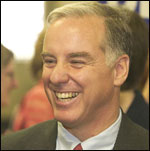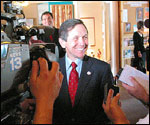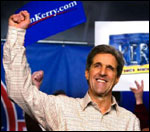
Paul Hawken.
It’s hard to believe it was only a month ago that environmental hotshots Paul Hawken, Bruce Babbitt, Bill McKibben, and Terry Tempest Williams published a joint endorsement of Howard Dean in Grist. “We’ve concluded that the blast of clean air coming from the millions of Americans that constitute the Dean campaign is the best chance for [positive environmental] change,” they wrote. “This democratic impulse seems to us an almost ecological imperative; something marvelous, and inevitable, blooming through the cracks in the concrete that the powers that be have poured over our political landscape.”
Shortly thereafter, Dean’s campaign took a turn for the worse, as John Kerry surged ahead in the presidential primaries. In an effort to make sense of the Kerry juggernaut and its environmental implications, Grist called Hawken at his houseboat outside of San Francisco to get his take on the turning of the political tides, as well as the larger movement to build a more sustainable world.
No stranger to the green community, Hawken founded one of the first natural-foods wholesaling businesses in the 1960s and cofounded the garden-supply company Smith & Hawken in the ’70s. Hawken has since written the best-selling books Growing a Business and The Ecology of Commerce, and most recently he coauthored Natural Capitalism with Amory and Hunter Lovins, calling for a shift toward a new sustainable economic model — a.k.a. “the next industrial revolution.” Hawken has helped to apply these principles of sustainability to the political platforms and business models of leading politicians and executives worldwide. His efforts won him, among other things, a spot alongside Mahatma Gandhi and John Lennon in Apple’s “Think Different” ad campaign.
What drew you to Dean? I was surprised you chose him given that he’s a moderate and you aren’t exactly a person with moderate inclinations.
Well, let’s just say I was extremely interested in Bush not being president. Dean is actually a moderate, and I was interested in electability. So it was a practical consideration. That may sound illogical in light of the recent Kerry juggernaut, but keep in mind that Kerry “Deaned” himself. He and the other candidates have been tearing pages out of Dean’s campaign playbook and it has been very effective.
How so?
Dean’s campaign was a political force like nothing we’ve seen in many years. The campaign raised more than $45 million with the average contribution under a hundred bucks. He and [his campaign manager] Joe Trippi wrote a new chapter in American politics. Trippi’s ability to organize and run a campaign and engender grassroots participation and involvement was a great gift to so many people who feel perennially disenfranchised. None of the other campaigns were doing that. Dean’s style — his candor — was a breath of fresh air.
Kerry has vaulted himself ahead basically by addressing core Democratic issues, something Dean did first. [Kerry is] speaking more forcefully about issues that affect core Democratic voters — jobs, corporate abuse, education, health care, and all that bread-and-butter stuff that Dean was the first to emphasize. Oh yeah, and Dean addressed the failure of Bush’s foreign policy, which sounded very persuasive coming from someone who actually did oppose the war.

Dean, in happier days.
Photo: Dean for America.
But more than anything, I think, Dean moved the dialogue in the campaign to corporate issues, corporatization, and the corruption of our executive and legislative branches. It’s ironic that Kerry’s money comes from the H.J. Heinz corporation [via his wife, widow of former Sen. John Heinz (R-Penn.)]. I am not sure the Republican Heinz family ever thought their money would support a candidate talking about “Benedict Arnold corporations.” Pretty interesting stuff we are hearing from the oligarchy, I would say.
Kerry has also done a remarkable job of positioning himself as a moderate, everyman Democrat with broad appeal and strengths across the board — from national security and health care to the environment — while Dean is now perceived as a niche Democrat.
Yes, the media are painting Kerry as more moderate, but of course if you compare their records, Kerry is more liberal and Dean is the moderate.
So it seems to have been to Kerry’s credit that he took so many cues from Dean to strengthen his campaign and broaden his appeal.
It’s very much to John’s credit that he learned from the voters and repositioned himself. John Kerry is a good man, not to mention being miles ahead of everyone else when it comes to understanding and acting on environmental issues. There’s no question in my mind that John would make a good president.
How ironic that Dean’s greatest strength — his candor — proved to be his greatest weakness.
Dean’s strength and weakness come from the fact that he has a lot of male hormones. He would have played a good right guard. It’s not like he’s got a lot of anima. He’s all animus. In some ways he didn’t appeal to women voters like a Clinton or a Kerry, who have a lot more anima.
So now are you going to throw your weight behind Kerry?
I will support the candidate who wins the [Democratic] nomination, no question. It looks like Kerry will, but nothing is sure.

Dennis Kucinich.
Photo: Kucinich for President.
So what are your thoughts about less centrist candidates such as Dennis Kucinich, who talks a lot in terms that you defined — calling for a radical shift toward sustainability and so on?
Well, if we’re talking about Dennis specifically, he’s a great guy. He’s really smart, but my opinion is that he can’t be elected so that affects my energy level on this subject. It’s not a judgment about him as a person, but he’s had plenty of time to show whether he’s electable, and as I’ve said, that’s my concern.
What’s your voting background? Have you always voted the Democratic party line?
No! Everybody I vote for loses. I’ve rarely supported a winning candidate.
So you voted for Ralph Nader in 2000?
Yup.
What made you shift toward your more practical voting attitude? Is it that you got burned by your idealism in 2000?
Well, I live in California and Gore had the state sewn up. And remember, we were doing vote swapping in key states across the country to ensure a Bush defeat. I wasn’t voting for Nader based on his electability. I thought it would be hard for Gore to lose and of course Gore didn’t lose.
I never would have supported Nader had I known that Gore would lose his home state or that he’d abandon Ohio, which he lost by just over 3 percent. I never imagined that Gore would run such a bad campaign.
So your confidence that he would win enabled you to vote a more pure ideological vote?
Not pure. It was more like a protest vote. I felt the sentiment well expressed by the bumper sticker: “Gore, please read your book!”
You mean Earth in the Balance?
Yeah. Because the fact is he just didn’t show up.
Clinton-Gore was such a disappointment to environmentalists. Do you think we can hope for more on the environment in a Dean or Kerry?
I think Kerry, if he’s elected president, will do far better than Clinton-Gore.
What makes you think that? Gore had a great record before he was elected.
But Gore wasn’t president.
You don’t think there’s some special-interest gridlock in Washington that makes it impossible to be a pro-environment president?
Well, I think Clinton-Gore created a kind of gridlock before they got elected — the way they raised money and catered to corporate interests, which forced them to support the WTO and NAFTA. I think they boxed themselves in and Gore didn’t have a lot of power and Clinton — who was probably the greatest genius to sit in the Oval Office — had his hands full.
Clinton loved your books. Didn’t he call Natural Capitalism the most important book of the decade or something?
Clinton does love that book and believe me, Amory Lovins and I are very appreciative. He especially liked it for its emphasis on market mechanisms for environmental restoration. But I’d say he was more enthralled with the environment in theory than in practice.

Getting Kerry-ed away.
Photo: Kerry for President.
Kerry talks about the environment every time he opens his mouth. And [his wife] Teresa Heinz Kerry has been funding initiatives in the environment for a very long time. And Kerry’s stepson Andrew Heinz is very literate and intelligent when it comes to the environment. So you have a great start there, in a way that we’ve never really seen before in the history of the American presidency.
And Kerry often points out that funding his own campaign enables him freedom from the special-interest quagmire. The way he’s approached his own fundraising gives him a lot more independence from political obligations.
Point well taken. But the Dean approach is even better — 600,000 funders.
Let’s talk about the Bush administration. What are your thoughts about their call for a shift toward a “new environmentalism”? In theory, anyway, doesn’t the Bush administration argue precisely what you argued in Natural Capitalism — that we are entering into a new era of environmental policy that will be supremely economically strategic and incorporate market-based strategies?
There are many market-based policy instruments that are interesting and are there to be explored, for sure, and Amory and I did suggest many of them in our book. But to invoke that language in a context where there isn’t any regard or concern for the outcome on the environment itself is just a terrible distraction. An emphasis on the market has to be coupled with a commitment to air, water, health, detoxification, climate change, and so on. There’s nothing of the kind in the Bush administration.
So to me to get involved in discussions about whether certain market mechanisms represent a new environmentalism is a canard. Those conversations have to be held within the framework of an overall objective of social justice and environmental restoration and those objectives are utterly lacking. The Bush administration represents a wholesale takeover of the environment by corporate interests.
But it’s true that the market can be used to spur environmental progress?
Absolutely. If you did carbon trading and put a cap on carbon emissions and lowered the cap every year — that would have a big effect. If you taxed externalities on coal, that would have a big effect. For the Bushies to invoke the market is fine, but they actually don’t really believe in using it in a way that would move us toward any kind of environmental progress.
Can you expand on the ideas in your book that outline new market mechanisms?
Oh, there are many. The one that has come up in California is the idea that you buy insurance at the gas pump. Twenty-five percent of all drivers in California are uninsured, so you could add 80 cents a gallon and everyone would be insured — it would cost less, [though] problem drivers with bad records would have to pay a premium, as would people with oversize vehicles. But other than that you pay for insurance as you drive. It would be fair, raise the price of gas, engender conservation, lower costs to consumers, and provide an incentive to drive more fuel-efficient vehicles. Everybody benefits except for the insurance and oil companies, which is why they spent so much money to defeat this initiative.
Yeah, that may not go over so well. So what are some other ideas?
It does go over well when people understand it, extremely well.
An automobile “fee-bate” is another example. Let’s say the average fleet mileage for cars and light trucks in the United States is 23 miles per gallon. You get a credit for every mile per gallon that your car gets above that average and you pay something for every mile a gallon under. You can even do it on a scale, so you get $100 for the first mile per gallon and $300 for the next and $500 for the next and $1,000 and so on. So that if [your car] got 60 miles per gallon, you’d get a $5,000 or $8,000 credit. If you buy a Humvee you’re paying $20,000 more. You don’t tell Detroit what to do. The market sorts itself out. There’s no mandate, there’s no regulation. There’s no CAFE [corporate average fuel economy] standard. But the result would be a dramatic increase in fleet mileage. And what happens is that the equilibrating effect of starting the fee-bate at the average mileage means that fleet mileage goes up every year for decades. Very elegant.
Interesting. That would surely do away with the car companies’ concerns that consumers don’t want to buy the efficient cars they put on the road.
Absolutely. What it would mean is a Toyota Prius would cost consumers $10,000, maybe less. And they are already on back order. What it requires is a larger objective: the realization that we don’t want to double-glaze the planet.
What are some companies that you think are successfully forging new, sustainable corporate practices?
Hmm … uh, well … there aren’t too many, and people don’t know them so well. Hartmann in Denmark, they do molded-fiber packaging. Uh, let’s see. Natura in Brazil is a cosmetic company that works very closely with indigenous people and farmers in Brazil. It works with poor people to develop cash crops that are productive and sustainable for their cultures. Novo Nordisk, they do a lot of work with enzymes that save energy and eliminate chemical use. There’s Plambeck in Germany that does great wind parks. STMicroelectronics is a company doing very interesting stuff with a new solar photovoltaic technology that could make solar energy cheaper than all other forms of electricity. Svenska Cellulosa is doing some great things with respect to sustainable forestry. Vestas, the big wind company in Denmark. Easto, a large organic produce company in Europe which does a lot of biodynamic stuff. And of course there is ShoreBank, the enterprise work that Ecotrust is doing, Patagonia, Cooperative Bank in England, and more.
So it doesn’t sound like there are many companies in America that you’re excited about. Can you compare some of these European companies to American companies? For instance, can you elaborate on why, say, Whole Foods doesn’t strike you as an example of a good company?
Whole Foods dismantles local food webs and doesn’t foster what the organic movement is about. The organic and natural-food movement that I helped kick off in the late ’60s was the beginning of recreating regional food webs. Local stores started all around the country and they began to source locally, and whatever they couldn’t get locally they got regionally, and whatever they couldn’t get regionally they got nationally. In terms of produce and bakery goods and other food items, there was a huge diversity of suppliers in the United States because there was a huge diversity of stores. Whole Foods went in and bought out the bigger, more successful stores and then rebranded them and did centralized purchasing for produce, which now comes from Chile and New Zealand and places like that. In the process, many local organic producers went out of business. Massive scale and centralization of power and capital is the antithesis of what we had in mind when we started the natural and organic-food business in the U.S.
But does that totally discredit the positive things they are doing?
Good deeds don’t erase bad outcomes. But let’s talk about the positive things they are doing.
Well, let’s say they use recycled packaging and keep pesticides out of the soil. Isn’t large-scale organic farming better than non-organic factory farms?
Yes, but still it’s large-scale agribusiness.
But they’re better than Safeway.
They are guided by profit. So are small companies. So far so good. But when a company gets large and dominant, the same instincts to survive and prosper can become unintentionally harmful. The natural-food movement is being bought up by Phillip Morris and H.J. Heinz and Jimmy Dean. That dog won’t hunt. It leads to a lowering of standards, and emphasis on price as opposed to cost. It leads to uniformity, power, concentration, and control. Luckily, there’s a slow food movement in the U.S. and lots of things happening that counter that.

Now that’s fresh fruit.
Photo: USDA.
And I guess what’s more troubling is that Whole Foods can get away with it more easily than Safeway because everybody thinks of them as green. The branding is so powerful that nobody thinks to question it.
To me the company that is exemplary is the New Seasons Market in Portland, Ore. They buy everything they can locally. These are real community food stores with wonderful food and fresh produce and fish. They know the purveyors, they talk about them. They really feed and enhance the local food web of Oregon and southern Washington and Northern California. They are to me your model of what a grocery store can do to help farmers and citizens and communities. And they’re price-competitive. I asked them why they didn’t come to the Bay area [where I live] and they said, “No! We’re local!”
So how could we push this model nationally? Can we introduce federal-level incentives?
Not really — it’s about culture and community. Anyone can do a New Seasons if they are in a community that wants it. And the people who started it — they have the DNA, they understand what it means to be socially and culturally responsible.
Can you talk about your own DNA in this regard. How you came to understand the meaning of sustainability?
That’s another interview.
Come on. Wasn’t there some watershed moment when you began to see the web of life or something?
Well, there were many. But my revelations were more the other way around — I began to realize how bizarre and poorly organized business is. That was what surprised me — how our basic value systems were lost in commerce. I was always curious to know why civility wasn’t a part of that world.
As kids, you learn that when a plate of cookies is passed out you don’t reach out first and grab them all and stuff them into your pockets. You wait until they are put in front of you, take one, and say thank you. But the environmental value system in the Bush era is about grabbing everything you can that’s on the table. It still shocks me to see that we have ghettoized and walled off a part of ourselves as a society — our civility — and then permitted greed to not just exist, but to express itself on a daily basis in our media, our politics, and our advertising. From our Clear Channels to our Wal-Marts to our Monsantos, McDonald’s, and Cokes — we’re not just talking about cookies anymore. These are people who gross billions of dollars a year and destroy local communities, jobs, and children.
Economists and apologists say live and let live, the market will sort itself out. We accept the fact that there are these predator corporations that don’t give a damn about the fate of America, its people, land, or culture. So for me, there wasn’t so much a revelation about doing good. The surprise has always been the ability of people in corporations to collectively ignore the good.
Could there be a rebirth of localization and a shift away from centralization?
There was a quote in The New York Times that said there are two superpowers in the world: One is the U.S. and the other is [world public opinion, or] civil society. Part of a best-case scenario is that the 120,000 groups in the world that comprise civil society’s effort to create a socially just and sustainable world are recognized as the true power in the world. [They are] comprised of people addressing the world’s needs in nonviolent and constructive ways. And this is the most untold story on Earth right now. This movement is growing — it’s an uprising, it’s the biggest movement in the world — and nothing can ultimately stop it despite the efforts of corporations, the military, and politicians to ignore and suppress it. Best-case scenario is that civil society continues to grow and develop. It’s the best case because it is non-ideological. It doesn’t concentrate power, it decentralizes it. It takes a lot of conversation and dialogue and patience, but ethically and morally it’s clean.
Time is speeding up beyond the point of any one person or any one government’s ability to comprehend the rate of change. No one knows what’s going on in the world. The rate of change is overwhelming us. How we come out the other end is going to be determined by what we do in our daily lives in small ways, how each of us contributes to the uprising and continues to engage locally, support good business, and value our community. It’s tempting to say our fate is going to be determined by Iraq and armies and terrorism and stuff, but it’s not. We have to be careful not to think that power is the ability to destroy. That is powerlessness. As my friend says, “Power is the capacity to implement reasoned intention.” And that power just does not exist in Washington, D.C.


